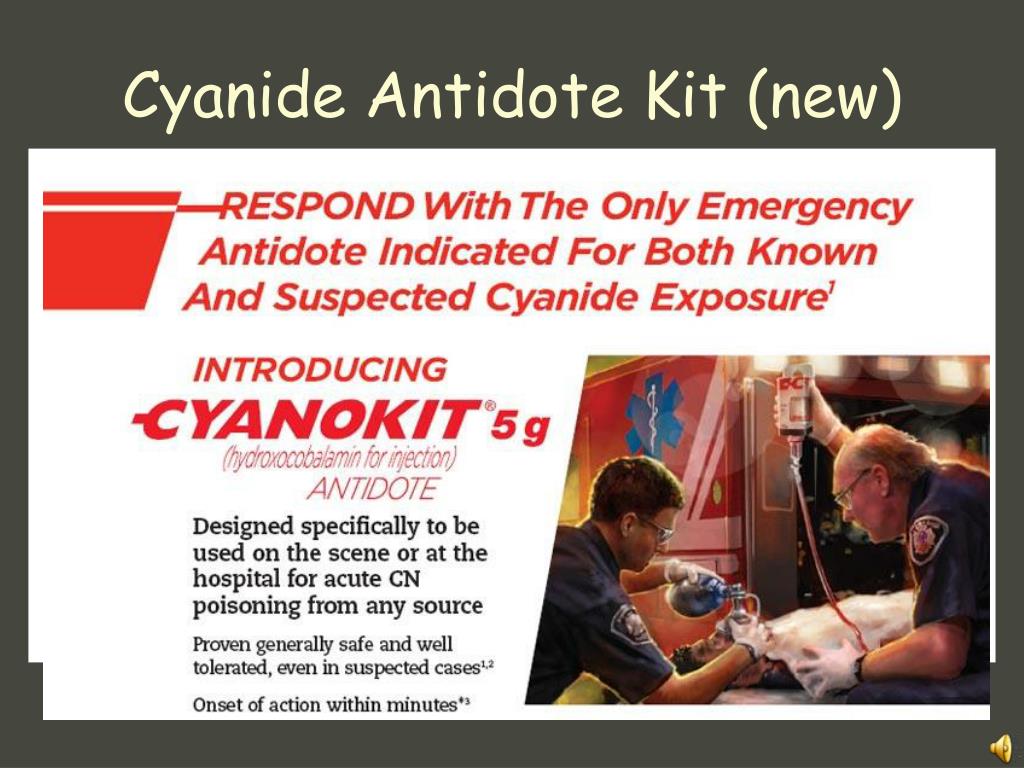
Lactate (normal lactate highly suggests another diagnosis).  Smoke inhalation injury (airway compromise). Household and commercial pesticides (diazinon and parathion). Prussic acid (AKA hydrogen cyanide, hydrocyanic acid, or formonitrile). Cyanide chemical weapon agents (Blood agents). Pulmonary chemical agents (Choking agents). Spastic upper motor neuron paraparesis seen in chronic ingestion of inadequately cooked casava. Rhabdo, bright red venules seen on fundoscopy. Bradypnea and pulmonary edema (non-cardiogenic), apnea. Bradycardia, hypotension, arrhythmias, asystole. Tachycardia, palpitations and hypotension.
Smoke inhalation injury (airway compromise). Household and commercial pesticides (diazinon and parathion). Prussic acid (AKA hydrogen cyanide, hydrocyanic acid, or formonitrile). Cyanide chemical weapon agents (Blood agents). Pulmonary chemical agents (Choking agents). Spastic upper motor neuron paraparesis seen in chronic ingestion of inadequately cooked casava. Rhabdo, bright red venules seen on fundoscopy. Bradypnea and pulmonary edema (non-cardiogenic), apnea. Bradycardia, hypotension, arrhythmias, asystole. Tachycardia, palpitations and hypotension. 
CNS stimulation ( Headache, anxiety, confusion).Inhalation exposure may cause syncope and death after only a few breaths.Inhaled toxins more rapid than ingested.Affected by dose, route, formulation and exposure pattern.They found 50% ROSC in fire victims in full arrest when hydroxycobalamin was administered. Full arrest without full body burns incompatible with life.Paris Fire Brigade protocol recommend hydroxocobalamin administration patients who have had known smoke inhalation in an enclosed space with any of the following: Causes switch from aerobic to anaerobic metabolism despite adequate O2.Binds to cytochrome oxidase in mitochondria leads to cessation of electron transport.Pits of peaches, pears, apricots, crab apples.
 Gaseous chemical weapon known as prussic acid, hydrogen cyanide, or hydrocyanic acid. Burning of nitrogen-containing polymers (plastics, wool, silk).
Gaseous chemical weapon known as prussic acid, hydrogen cyanide, or hydrocyanic acid. Burning of nitrogen-containing polymers (plastics, wool, silk).  5.2 Cyanide Antidote Package (Lilly kit). The total oxygen-carrying capacity reduced by the combination of carboxyhemoglobin and methemoglobin was never more than 21% (range, 10% to 21%) in this series.ĬONCLUSION: The administration of sodium nitrite to smoke inhalation patients in the presence of concomitant carbon monoxide poisoning may be relatively safe. The peak measured methemoglobin levels (mean, 10.5% +/- 2% range, 7.9% to 13.4%) did not occur until a mean of 50 minutes (range, 35 to 70 minutes) following administration of sodium nitrite. Methemoglobinemia was evaluated in four patients after sodium nitrite administration. RESULTS: The mean observed half-life of cyanide was 3.0 +/- 0.6 hours. INTERVENTIONS: Peak level and half-life were determined by obtaining serial carboxyhemoglobin, cyanide, and methemoglobin levels. PARTICIPANTS: Seven critically ill smoke inhalation patients referred to the regional poison center. SETTING: Regional poison center and regional toxicology treatment center. STUDY OBJECTIVE: To evaluate serial cyanide, methemoglobin, and carbon monoxide levels in smoke inhalation patients.
5.2 Cyanide Antidote Package (Lilly kit). The total oxygen-carrying capacity reduced by the combination of carboxyhemoglobin and methemoglobin was never more than 21% (range, 10% to 21%) in this series.ĬONCLUSION: The administration of sodium nitrite to smoke inhalation patients in the presence of concomitant carbon monoxide poisoning may be relatively safe. The peak measured methemoglobin levels (mean, 10.5% +/- 2% range, 7.9% to 13.4%) did not occur until a mean of 50 minutes (range, 35 to 70 minutes) following administration of sodium nitrite. Methemoglobinemia was evaluated in four patients after sodium nitrite administration. RESULTS: The mean observed half-life of cyanide was 3.0 +/- 0.6 hours. INTERVENTIONS: Peak level and half-life were determined by obtaining serial carboxyhemoglobin, cyanide, and methemoglobin levels. PARTICIPANTS: Seven critically ill smoke inhalation patients referred to the regional poison center. SETTING: Regional poison center and regional toxicology treatment center. STUDY OBJECTIVE: To evaluate serial cyanide, methemoglobin, and carbon monoxide levels in smoke inhalation patients.








 0 kommentar(er)
0 kommentar(er)
